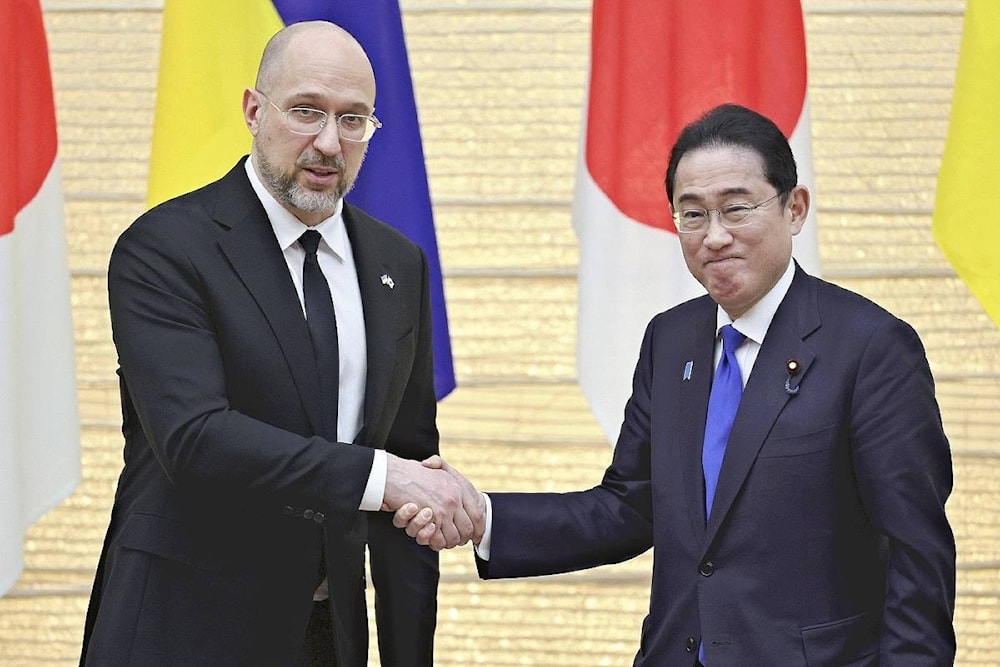Japan to ink range of agreements with Kiev, deepens involvement in war
The NHK news broadcaster says that the two countries will sign bilateral agreements across several fields including intelligence collaboration.
-

Prime Minister Fumio Kishida shakes hands with Ukraine Prime Minister Denys Shmyhal in Tokyo, Japan on February 19 (Japan MOFA)
Japan and Ukraine plan to sign a 10-year bilateral agreement at the upcoming G7 summit, NHK reported on Saturday citing sources, as Tokyo continues to expand its involvement in the war with Russia, already providing $7.6 billion in aid to Kiev.
This move comes as part of the Asian country's ongoing support to Ukraine in security, energy, and humanitarian assistance, the Japanese broadcaster added.
Read more: G7 to keep Russian assets frozen until reparation to Ukraine paid
The agreement will include non-lethal equipment and supplies, medical care for injured soldiers, intelligence collaboration, landmine clearance, and agricultural development.
The group's meeting is set to take place between June 13-15 in Italy's Apulia.
In the upcoming summit, US President Joe Biden seeks to convince the bloc's leaders to support a scheme that could generate up to $50 billion in loans for Ukraine to finance its war efforts by seizing interests out of Russia's sovereign frozen assets in the West - which amount to around $280 billion, most of which trapped in European financial institutions.
Unforeseen risk to global financial system
However, before they agree to the plan, many details need to be finalized, a source familiar with Biden's proposal told VOA earlier. If approved, the seized capital could be funneled to Kiev within the next few months.
The G7 finance ministers said after a meeting in May that "progress" has been made to determine how to use frozen Russian funds to aid Ukraine, as the process has been postponed for over a year over complex legal hurdles.
No concrete plan was established, but the ministers agreed to support the measure in principle, claiming that it would be "consistent with international law and our respective legal systems."
“They talked through a number of options that will allow us to make sure that Ukraine has access to the money you need to not only invest in the economy but to invest in defense,” US Treasury Deputy Secretary Wally Adeyemo told VOA. “And my expectation is that as we get to the leaders meeting, those leaders are going to endorse some of those options.”
Kristine Berzina, managing director of Geostrategy North at the German Marshall Fund, stated that although there is a general consensus to support Kiev as much and as soon as possible, giving out loans based on anticipated returns from frozen assets poses complex legal and regulatory challenges.
“How do you lend against the anticipated profits of the assets, how does that fit into the existing sanctions regime, and how long will those assets truly be frozen?” she told VOA. “How can you guarantee that the sanctions which freeze these assets do not get changed by the Europeans before that 50 billion is provided?”
The International Monetary Fund IMF cautioned as well that Western plans to seize frozen Russian assets could pose a threat to the global monetary system and entail unforeseen risks.
"From our perspective, it is important that any actions have sufficient legal underpinnings to avoid potential risks, and these include risks of litigation, risks of countermeasures, and risks to the international monetary system," IMF spokesperson Julie Kozack told reporters.

 3 Min Read
3 Min Read








